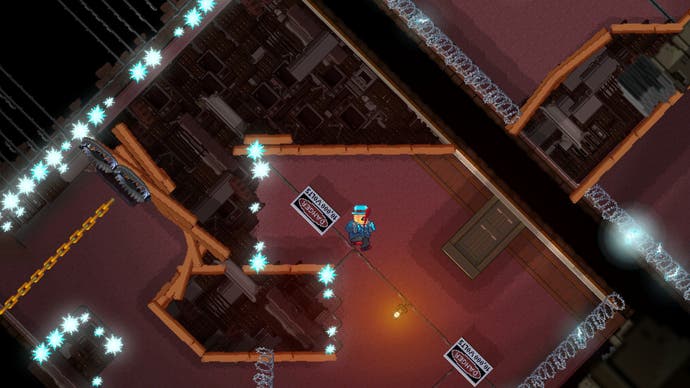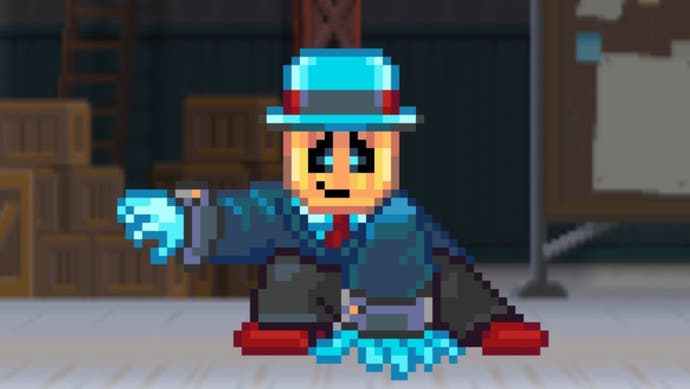Horace review - a glimpse into a singular mind
Closely observed brains.
Schubert's Unfinished is a lovely bit of music. So strange, so contradictory. It's multi-faceted, all theatrical baddie, and then fun-on-a-swing for a bit as it swoops politely back and forth, and then it gets properly dramatic, brooding, insistent, filled with genuine menace. Spielberg dropped it into Minority Report to capture the shifting thoughts of an agent investigating a crime that has yet to happen, possibilities dreamt up and discarded. I think Beck uses it, that long arcing note near the start, in one of his cut-ups. I know almost nothing about music, but Schubert's Unfinished is one of those pieces I keep an ear out for. It's always a thrill - always a sign, I tell myself, of sympathetic tastes. (Bonus Schubert fact I only just discovered: his friends called him "Little Mushroom".)
Horace features a chiptune version of Schubert's Unfinished. Early in proceedings, one of the first sequences. I noted it and moved on, one cherished reference amongst others. Is that the old Thames TV logo? Is that a Ford Capri? If you are a person of a very certain age - actually given the Schubert thing I may have messed this opening up a bit - Horace will make a very pleasing first impression. Good thing too. This wilful, intensely personal game from Paul Helman and Sean Scaplehorn arrives on Switch with quite a daunting reputation. It took six years to make! It's weird and constantly evolving, I'd read, a sort of Tristram Shandy of a platformer! It never settles down, you never know what to expect! It seems to have come through a wormhole from a distant part of the universe!
Yet it's sort of comforting. For players of a very certain age Horace kind of makes sense. For me, it harks back to the flickering days of the Commodore 64 when games came on tapes and were all glimpses into the singular minds of the singular people who created them. Platformers ruled, and the graphics were so simple and abstract that surrealism was the norm. Re-runs of Monty Python and the books of Douglas Adams were the main cultural currency for people who liked computers. The soundtracks were always beautifully pieced together versions of copyright free classics: Moonlight Serenade, The Entertainer, Schubert's Unfinished.
Horace belongs to this tradition. It's an exacting, sometimes punishing platformer, but it's also a glorious yard sale of ideas and memories. References to Bill and Ted knock along with the Dead Kennedys and 2001: A Space Odyssey. There are playable riffs on OutRun and Space Harrier and Space Invaders. At one point you play Pong against a Pong cabinet. There's a chiptune cut of Zadok the Priest. You can play basketball and walk on the ceiling and engage in Rhythm Action games and take jobs and earn money and defeat bosses and and and...
It's odd, then, that it should all feel so coherent. I think it's grounded in what script doctors would call emotional consistency. Horace is the story of a robot, surrounded by humans trustworthy and untrustworthy, navigating a strange and familiar world as he inches closer towards fulfilment. He has a personal mission to collect a million pieces of junk that are scattered around the place, but this is really a story of innocence and experience. It reminded me of Closely Observed Trains a bit: comedy and melancholy, a naive hero exploring the disconcerting world of grown-ups. It's clever and funny and moving.
And regardless of how often the design throws in new elements, this story is strung along a range of precise platforming levels. They just get more elements to play with. A town where you can go for jobs, a gentle bit of Metroidvania, a dream of flight, a prison break. No matter: walk and run from platform to platform, dropping up onto the ceiling if it's close enough, collecting garbage, avoiding enemies, finding the right orientation to a level to clear the next challenge, racing through gauntlets that include crumbling cliff-tops, huge pistons, saw blades.
It piles up, mechanically, but it always remains comfortably this side of playable. Instant restarts are as welcome as the generous checkpointing, and then there's the sheer thrill of what you'll be encountering next: a basketball court that is used to teach you to pick up and throw objects, but which is also a basketball court! Or an arcade with working machines, or a vehicle you get to try out for a bit, a boss fight, an on-rails shooty bit, a dishwashing mini-game. Satire and class warfare and Mr Benn and King Ralph 2.

Really, the story of Horace is probably the story of its creation. I was left wanting to know: how did this come to be? How much was planned? How much was learning to do one thing and then learning how to do something else with it? How much was riffing, day-to-day, on this strange thing that was coming together on the screen, always changing shape, but always remaining harmonious?
That's the surprising word for it, I think. Horace is exhaustive and exhausting, punishing and generous, wilful and breezy, tragic and alive to beauty. And it's all harmonious. Schubert would be pretty happy about things.



